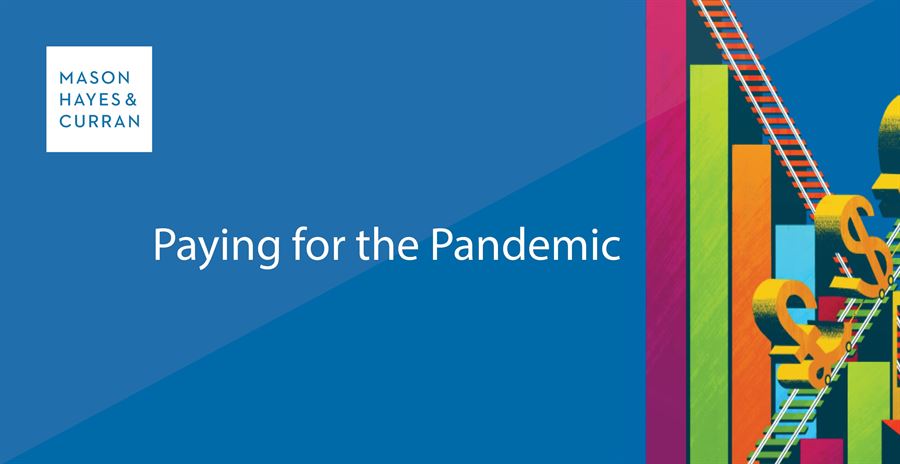
COVID Restrictions Support Scheme
The highlight of the Budget announcements for many businesses adversely affected by COVID-19 is the new COVID Restrictions Support Scheme (CRSS). This allows businesses which have been prohibited / restricted from trading due to COVID-19 restrictions, and have suffered an 80% decline in turnover compared to 2019, to apply to Revenue for a cash payment representing an advance credit for tax deductible trading expenses for income or corporation tax purposes. Payments will be calculated at 10% on the first €1m of VAT exclusive turnover and 5% thereafter. This is based on average turnover for 2019 and subject to a maximum weekly payment of €5,000. The scheme will apply to businesses subject to Level 3 restrictions or higher, from 13 October 2020 to 31 March 2021.
Debt Warehousing and Phased Payment Arrangements
Other measures designed to ease some of the financial burdens brought about by COVID-19 include two major tax reliefs: debt warehousing and phased payments arrangements (PPAs).
Debt Warehousing
Debt warehousing allows certain Revenue debts to be “locked up” i.e. interest and penalty free for 12 months, giving businesses some breathing space and easing cash flow pressures. The relief applies automatically to SMEs with a turnover < €3m, and to larger businesses subject to Irish Revenue approval.
Taxpayers can avail of warehousing to defer paying VAT and PAYE debts incurred during the pandemic, due to ceased or restricted trading, for 12 months. After the warehousing period, interest will be charged at a reduced rate of circa 3% per annum on any warehoused debt until discharged.
Budget 2021 expanded the debt warehousing scheme to cover repayments owed by employers under the Temporary Wage Subsidy Scheme. It also now covers the balance of income tax for 2019 and preliminary tax due for 2020 for adversely affected self-employed taxpayers. Likewise for balance of tax for 2020 and preliminary tax for 2021, where income has dropped by a certain level.
Phased Payments Arrangements
Debts which cannot be warehoused can be carried forward at a reduced interest rate (3% versus 8-10%) and repaid according to a PPA. This is a valuable relief but must be agreed with Revenue by 31 October 2020.
Importantly, warehousing and / or availing of a PPA scheme will not impact on a taxpayer’s ability to obtain tax clearance or preclude the availability of the Employment Wage Subsidy Scheme or the Stay & Spend Scheme.
Stamp Duty
Budget 2021 announced the extension of the Residential Development Stamp Duty Refund Scheme until 31 December 2022. This relief is designed to incentivise developers to build residential units by reducing the effective rate of stamp duty on land purchases to 2% for completed residential schemes. The time interval allowed between commencement and completion of construction is also extended to 30 months.
EU Anti-Tax Avoidance Directive
The EU Anti-Tax Avoidance Directive (ATAD) measures in the form of the interest limitation and anti-reverse-hybrid rules will be enacted with effect from 1 January 2022, following completion of an on-going consultation process.
To recap briefly, these interest limitation rules will cap the amount of interest expense which is tax deductible in a given year to fixed ratio of up to 30% of (group) EBITDA. Ireland is expected to set a minimum amount which is deductible at €3m per annum. The new rules could result in a significant reduction in the tax write off some companies and groups will be able to claim for interest costs, in a particular year.
Financial undertakings e.g. banks and regulated funds are outside the scope of these rules. The rules will apply to most other corporate borrowers and will have the biggest impact on those which are highly leveraged so we expect there will be some restructuring around the introduction of these rules in the coming year.
DAC6
The EU Council Directive on Administrative Cooperation (DAC6) introduced an EU wide mandatory reporting regime for cross-border arrangements that bear certain tax related hallmarks. The regime imposes requirements on intermediaries, and in some cases taxpayers, to report certain arrangements to the Irish Revenue who in turn will report such transactions to other EU Member States.
The regime applies to reportable cross-border arrangements implemented since 25 June 2018.The filing deadline for arrangements implemented between 1 July 2020 and 31 December 2020 is 31 January 2021 and for earlier arrangements is 28 February 2021.
An intermediary includes any person who designs or manages the implementation of a reportable cross-border arrangement e.g. tax lawyer, tax advisor, and also any person who provides advice or assistance on the implementation of such an arrangement e.g. bankers, insurance companies, asset managers. In certain circumstances, the reporting requirement falls to the taxpayer e.g. where there is no intermediary.
Financial services companies should consider their DAC6 reporting obligations in various capacities: as an intermediary, as a taxpayer or as a party to a reportable transaction e.g. as lender. Establishing processes to identify reportable arrangements and the categorisation of their role will be key, as well as obtaining commitments from any other intermediary or reporting party that they will comply with their own obligations.
The tax measures introduced in recent months have been largely shaped by the COVID-19 pandemic and, together with the recent stimulus measures introduced in Budget 2021, should provide some welcome relief for businesses at this time.
However, implementing new requirements under ATAD and DAC6 may prove challenging for affected businesses over the coming year so it is important that taxpayers are aware of their obligations under these EU Directives to enable sufficient time to comply.
We invite you to contact a member of the tax team should you require assistance or specifics in relation to any of the matters outlined above.
The content of this article is provided for information purposes only and does not constitute legal or other advice.




